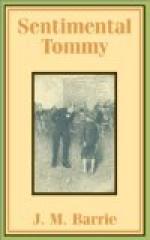The watchers retired into the field to compare impressions, and Elspeth said emphatically, “I like her, Tommy, I’m not none fleid at her.”
Tommy had liked her also, but being a man he said, “You forget that she’s an ill one.”
“She looks as if she didna ken that hersel’,” answered Elspeth, and these words of a child are the best picture we can hope to get of the Painted Lady.
On their return to the window, they saw that Grizel had finished her ca’ming and was now sitting on the floor nursing a doll. Tommy had not thought her the kind to shut her eyes to the truth about dolls, but she was hugging this one passionately. Without its clothes it was of the nine-pin formation, and the painted eyes and mouth had been incorporated long since in loving Grizel’s system; but it became just sweet as she swaddled it in a long yellow frock and slipped its bullet head into a duck of a pink bonnet. These articles of attire and the others that you begin with had all been made by Grizel herself out of the colored tissue-paper that shopkeepers wrap round brandy bottles. The doll’s name was Griselda, and it was exactly six months old, and Grizel had found it, two years ago, lying near the Coffin Brig, naked and almost dead.
It was making the usual fuss at having its clothes put on, and Grizel had to tell it frequently that of all the babies—which shamed it now and again, but kept her so occupied that she forgot her mother. The Painted Lady had sunk into the rocking-chair, and for a time she amused herself with it, but by and by it ceased to rock, and as she sat looking straight before her a change came over her face. Elspeth’s hand tightened its clutch on Tommy’s; the Painted Lady had begun to talk to herself.




